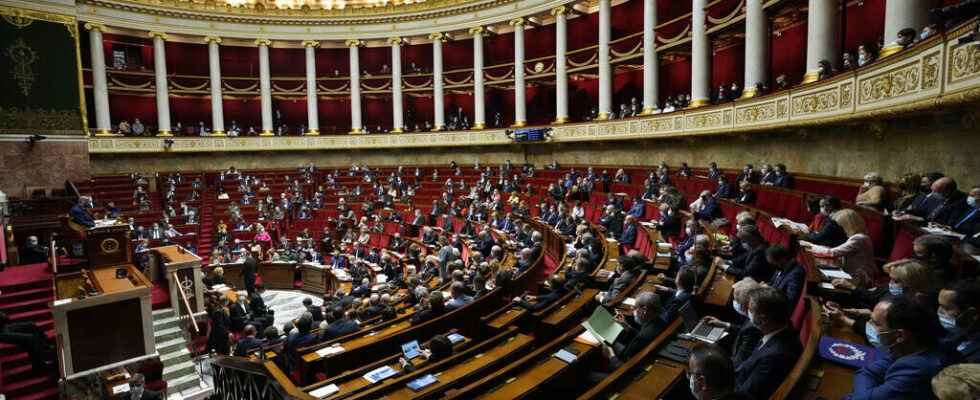Which French MPs are most in favor of bills to protect our environment? To answer this question, the Agir pour l’Environnement association has launched a website to compare them. But beyond the classification, disputed by the most mistreated deputies, the initiative reveals the difficulty of knowing the daily positions of the deputies in the National Assembly.
577 French deputies, a trombinoscope sorted with three colors: green, orange, red. The principle is simple, the site uncluttered and the message clear. Parliamentland ranks MPs in favor of their positions on 17 different votes. The MP voted against the ban on the spreading of phytosanitary products near homes? Minus one point. He did not participate in the vote on compensation for victims of the use of phytosanitary products? 0 dots. He voted for the establishment of a tax on nitrogen fertilizers? One more point. The theoretical maximum score is therefore 17 points, the minimum, -17, althoughno MP achieves either.
Informing parliamentary activity
The methodology was not easy to put in place, especially at the level of the selection of laws to establish this classification, explains Mathias Chaplain, coordinator of the campaigns of Agir pour l’Environnement, the association behind the ‘initiative. ” We avoided taking bills from the socialist group or France insoumise, because they would have been rejected en bloc by the opposition, thus distorting the results. We therefore retained only bills proposed by the government and amendments from other parties. »
Amendments from different parties, right and left, have therefore also been taken into account, to tend towards a certain representativeness of parliamentary work. It includes the amendment proposed by La France Insoumise (LFI) to ban domestic flights in the event of a rail alternative of less than 4 hours, or the ban on importing foodstuffs produced using substances prohibited in the European Union, led by the Les Républicains group. Out of 17 votes, 9 concern measures taken by the left in the broad sense (from LFI to the PS), 3 on those of the Republican right and 5 on those of the presidential majority.
Another difficulty highlighted by the association is the relative opacity of the daily positions of the deputies. Difficult for a French citizen to know who is voting for what apart from solemn votes. A deputy does not only vote to ratify a law: he also votes to support or reject amendments, as well as in the committees responsible for producing legislative proposals.
However, it is often impossible to know whether such a member supported or rejected such an amendment, because the voting positions are not known, except in the case of a so-called public ballot. This is one of the regrets of the association, which could not therefore be as precise as hoped. A reproach of partiality carried by many deputies pinned by the initiative, like Jean-Luc Fugit, deputy of the Rhône, classified at the bottom of the classification. He denounces in a press release an intervention “ biased in an election campaign ” a few days before the legislative elections, and affirms that “ the real ecological assessment of the five-year period is not to be found in a few amendments, but in the decisions and the major ecological laws of the five-year period “.
Mathias Chaplain defends the association from any partiality: ” We did not select amendments to achieve a result that we had predetermined. We had a lot of trouble finding these 17 votes, which we then entered into software. We didn’t know who was going to be first, last, and we had a few surprises, in particular Mr. Fugit, president of the National Air Council and president and member of the sustainable development commission, we didn’t expect it. »
A disinterest of deputies for ecology?
Despite the protests, Mathias Chaplain hopes that the final result will shed light on the position of the deputies on the environment. ” We really wanted to show the resident of a constituency how their MP votes, to make this connection, so that the MP stops thinking he is completely safe by voting a little as he wants, or by going away. »
Because it is indeed absenteeism that has had the greatest impact on Acting for the Environment. ” We are still on major laws that concern the daily life of the French. However, on average, out of the 17 polls that we analyzed, we arrive at an attendance rate of 85 deputies out of 577, i.e. 14.7% attendance rate regrets the association’s campaign coordinator. A sometimes weak activity among certain deputies closely followed by a another website for citizensbut which is due to many factors.
For the association, this lack of interest is directly linked to the lack of knowledge of ecological issues among French deputies. During the Citizen’s Climate Convention, people completely disinterested in ecology proposed laws perceived as radical after having been trained on these subjects, recalls the representative of Agir pour l’Environnement. ” If the deputies did this same work within the framework of major laws on ecology, by being present in committee, in the hemicycle at the time of the debates, perhaps that would make it possible to advance files. “, hopes without believing the activist too much. Because time is running out: global warming and the loss of biodiversity are accelerating in France, as everywhere in the world.
► Read also: Uganda: French deputies questioned about the giant TotalÉnergies project
